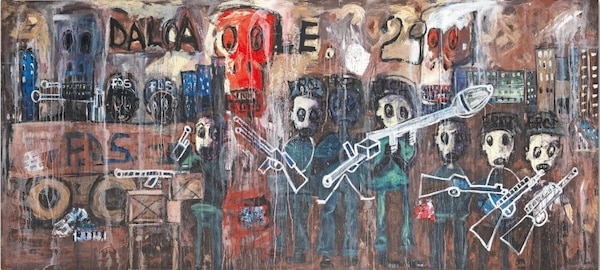Dear friends,
Greetings from the desk of Tricontinental: Institute for Social Research.
Reason seems to have been gradually abolished by the language of bombs. As weapons systems get ‘smarter’ and ‘smarter’, the range of diplomatic instruments used by the Global North states becomes blunter and blunter. U.S. and European diplomats have returned to the old colonial habit of speaking loudly and brusquely, lecturing the natives about what they should or should not do while they themselves do whatever they want. If the natives do not agree, then the old colonial rulers simply threaten to cut off their hands or bomb their homes.
When the International Criminal Court tried to open a file to investigate U.S. atrocities in Afghanistan, Washington reacted by revoking the prosecutors’ visas and threatening to sanction their families. More recently, the United States government sanctioned UN Special Rapporteur Francesca Albanese for her report on corporate complicity in the Israeli genocide against the Palestinian people. This gangster-like behaviour reflects the longstanding attitude of colonial rulers, indicating a return to a period when the West sent its gunboats to threaten our countries to trade as they wanted us to trade rather than to trade as equals. During the colonial period, that form of behaviour was called gunboat diplomacy. What we have now is an updated version: nuclear missile diplomacy.
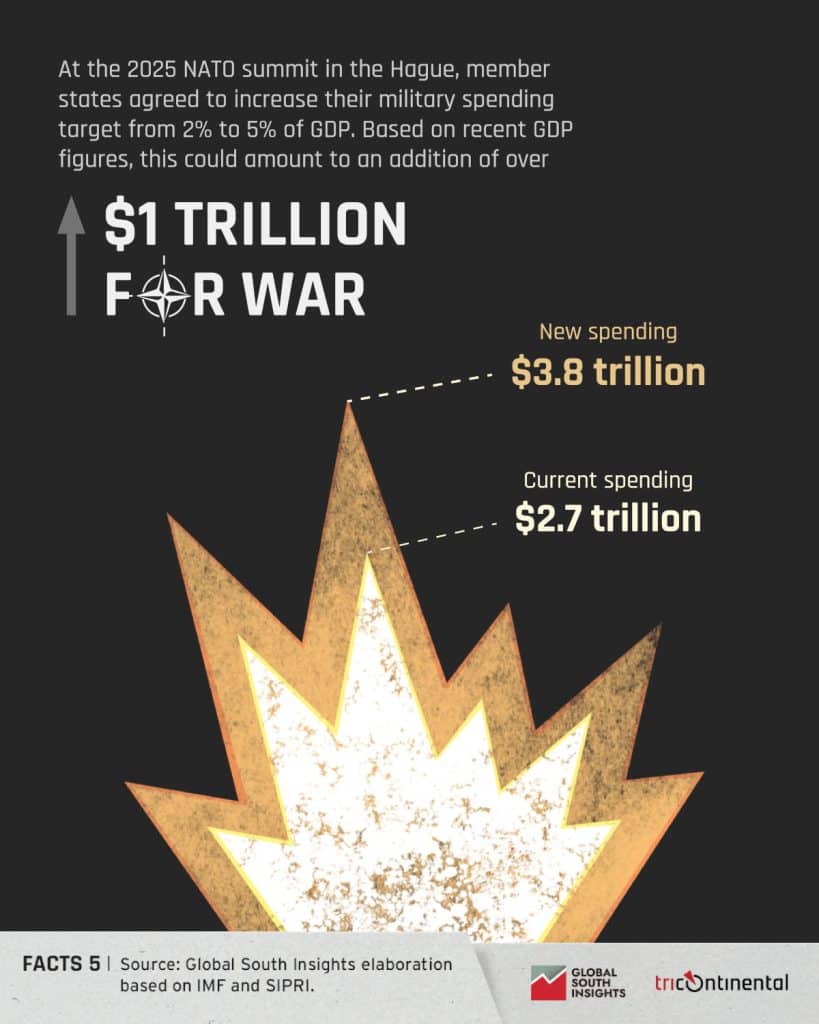
The 2025 North Atlantic Treaty Organisation (NATO) summit at The Hague offers yet another example of this nuclear missile diplomacy. The final communiqué was the shortest produced at any NATO meeting, with only five points, two of which were about money. The Hague Declaration was only 425 words, whereas the Washington Declaration, issued at the 2024 summit, was 5,419 words (44 paragraphs). This time there was no granular detail about this or that threat, nor was there a long and detailed assessment of the war in Ukraine or how NATO supports that war without limit. While the 2024 declaration asserted that ‘Ukraine’s future is in NATO’, this position was nowhere to be found in the 2025 statement. It was clear that the United States simply would not allow a laundry list of NATO’s obsessions. Instead, it was the U.S. obsession that prevailed: that Europe increase its military spending to pay for the U.S. protective shield around the continent.
Under U.S. pressure, NATO states formally agreed to increase their military spending to 5% of their Gross Domestic Product (GDP) by 2035. Since many NATO members have not even met the previous 2% target, this move will likely spark serious domestic debates across the alliance. By our calculations, as the FACTS graphic above shows, NATO states currently spend $2.7 trillion on war making. As they move to increase military spending to 5% of their GDP, that number will rise to $3.8 trillion—a good $1 trillion more than in previous years.
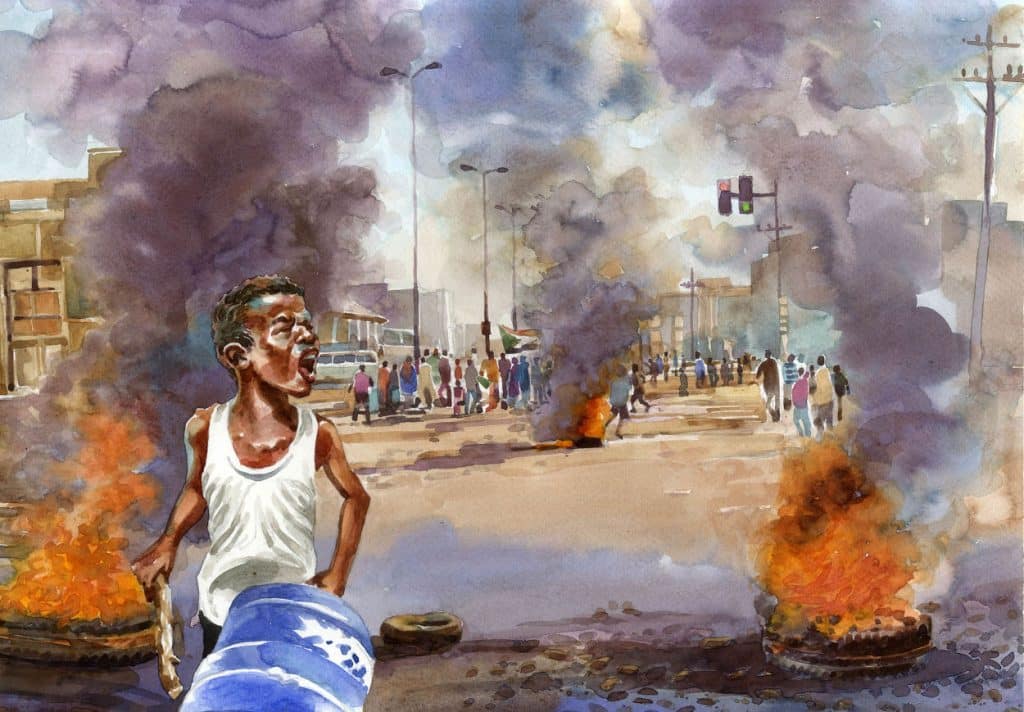
Hussein Mirghani (Sudan), Untitled, 2019.
What else could be done with $1 trillion? For one, global hunger could be eradicated in twenty to twenty-five years, hunger among children could be eradicated immediately, or the entire $11.4 trillion external debt of developing countries could be paid off in just over a decade. As it stands, the United Nations (UN) has warned that the Sustainable Development Goals (SDGs) will not be met by their target year of 2030 and might in fact be delayed by decades, if not a century. One of the most alarming areas of backsliding is SDG 2: Zero Hunger. The UN Food and Agriculture Organisation (FAO) estimates that, absent major inflation shocks or geopolitical and geological disruptions, it would take an extra $40 to $50 billion per year to end global hunger. Instead, that money is being spent to blow up food systems rather than build them.
In 2024, global military expenditure reached $3.7 trillion. That same year, the United Nations approved an annual budget of just $3.72 billion (which includes peacekeeping). The UN budget, therefore, is only 0.1% of the global arms budget. It is difficult to look at these figures and not feel the futility of advancing an agenda for peace between peoples and diplomacy between states. There is so much that needs to be solved and yet so little that is being done in this dispensation—however limited—to solve these problems.
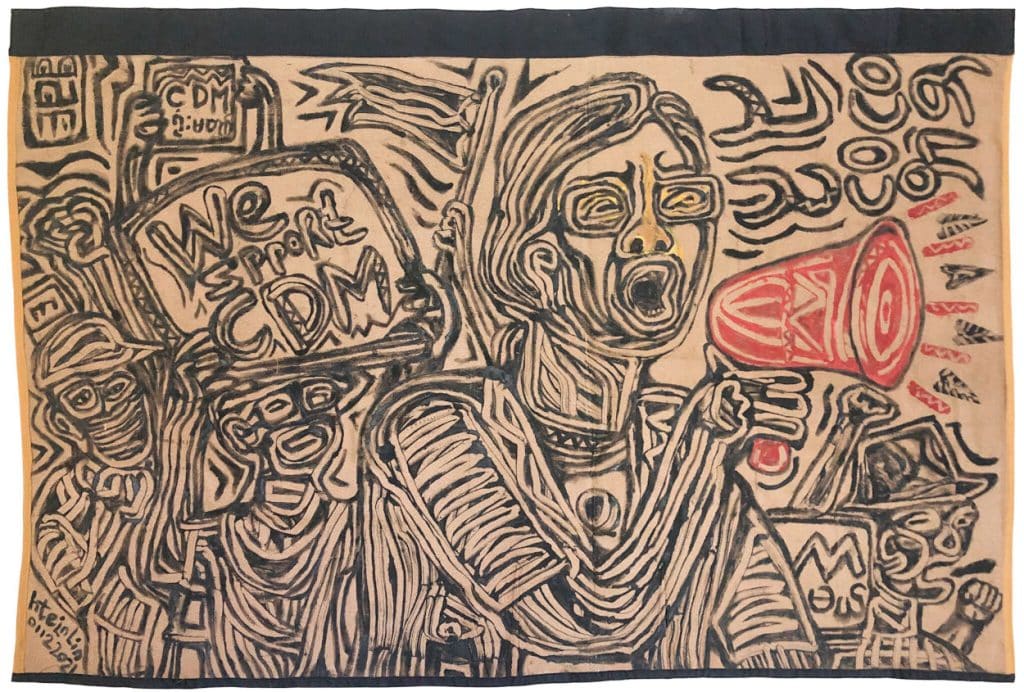
Htein Lin (Myanmar), Loudspeaker, 2021.
NATO states agreed to U.S. President Donald Trump’s mandate to increase military spending to 5% of their GDP without any dispute. Because of their various neoliberal debt brakes, they will have to cut social spending in order to pay for their increased arms production and purchases. Germany, which has the largest GDP in Europe, is nonetheless mired in deep social problems; for instance, 21.1% of the German population faces the risk of poverty or social exclusion. The German government, led by Chancellor Friedrich Merz, has pledged €650 billion over the next five years toward military spending in order to reach the 5% target by 2035—an amount even the Financial Times finds to be ‘staggering’. To meet this pledge, Germany will need to raise about €144 billion per year, primarily through budget reallocations—i.e., austerity — and increased borrowing—i.e., debt (raising taxes is unlikely, even in the form of regressive value-added taxes on consumption).
In other words, what Europe and the United States have adopted is the path of austerity and war. That is their promise to the world for the period ahead. Meanwhile, at the 17th BRICS Summit in Rio de Janeiro (Brazil), the BRICS+ countries—which now include Indonesia—opted for a different worldview. The BRICS+ statement called for programmes ‘for the benefit of our people through the promotion of peace, a more representative, fairer international order, a reinvigorated and reformed multilateral system, sustainable development, and inclusive growth’. The key words here are peace and development.
That is the choice that has been laid out before us: austerity and war on the one hand, or development and peace on the other.
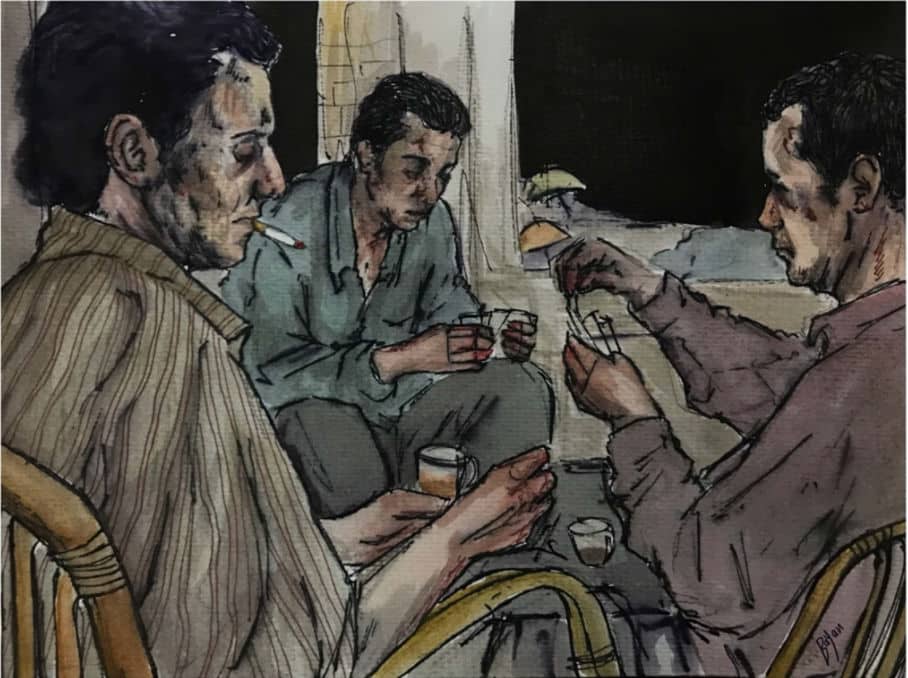
Bayan Abu Nahla (Palestine), Break on the Beach, 2023.
Faced with this choice, we rage, we weep, we take to the streets and refuse to allow for any direction other than peace. This was how the Iraqi poet Badr Shakir al-Sayyab (1926—1964) felt in 1953 after he was expelled from Iraq for his participation in the failed 1952 Iraqi Intifada against the monarchy. Later that year, in Tehran, he witnessed the CIA-backed coup that removed Prime Minister Mohammad Mossadeq from power and restored the Shah of Iran. In 1954, he wrote the long poem ‘Weapons and Children’ (الأسلحة والأطفال). A passage from it is presented below:
‘Iron’
Who is all this iron for?
For a chain twisting around a wrist
A blade held to breast or vein
A key to the prison door for those that are not slaves
A noria that scoops blood.
‘Bullets’
Who are all these bullets for?
For miserable Korean children
Hungry workers in Marseille
The people of Baghdad and the rest
Whoever wants to be saved
Iron
Bullets
Bullets
Bullets
Iron…
I hear the merchant
And the laughing children,
And like the blade before the victim notices,
Like lightning scattered in my mind
Like a screen, like a wound gushing blood —
I see craters rumbling —
Filling the horizon—flames, and blood
Pouring down like rain showers, filling the expanse
Bullets and fire. The face of the sky
Scowls whenever iron shakes it
Iron and fire, fire and iron…
Then the impact, then the bomb!
Thunder everywhere,
Lifeless body parts, and the rubble of a home.
Old iron for a new battle
Iron… to level this waterless desert,
Where children drew in the sand
And where older folks thought it was safe.
‘Peace’
As if the spark in the letters
Is covered over by the darkness of caves,
With the hopes of the first man.
What picture did he inscribe on the stones,
Spurred on by death: is it a victory,
A longing for the best of worlds?
That is the choice: iron or peace, bullets or development. There is no peace through guns, no development through bullets. This is a choice. You must participate in making this choice. Your silence leads to guns and bullets and war; your voice, if it is loud enough alongside the voices of others, might take us to peace and development, the laughter of children as they play without fear in the dusk.
Warmly,
Vijay

